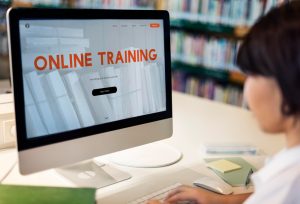What is online training and why is it becoming increasingly popular?
Online training It means the transfer of knowledge and skills over the internet, usually using online platforms, video content and interactive tools. Unlike traditional education, it allows us to learn anytime, anywhere – at a pace that suits us.
What does online training mean?
It is a structured form of learning that includes digital materials, quizzes, video lectures, and often mentoring support - all accessible online.
Comparison with traditional education
Online training differs from traditional, physical education in many ways. One of the key advantages is the fact that does not require physical presence in the classroom, which means lower costs for participants and organizers – no need for travel, accommodation or printing materials.
In addition to cost-effectiveness, online learning brings greater time flexibility. Participants can determine when and how quickly they will process individual content, which allows for better coordination of learning with other obligations (work, family, free time).
Another important difference is the larger individual flexibility of the learning path. While traditional systems often rely on a one-size-fits-all approach, online programs allow for personalization – from module selection to the way exercises are delivered. This allows participants to build knowledge based on their interests and abilities.
Benefits of online training for individuals and companies
- Efficiency and adaptability Participants can learn at their own pace, without the disruption of daily obligations. This is especially beneficial for employees and parents.
- Lower costs There are no travel costs, classroom rentals, or printed materials. One platform can meet the needs of an entire team.
- Access to global knowledge Online training provides access to renowned experts and institutions from around the world.
Types of online training: Which format to choose?
- Self-paced courses (e-learning)
Pre-prepared modules that participants can complete at any time. - Webinars and live lectures
Real-time online training with the ability to ask questions and interact with the mentor. - MOOC (Massive Open Online Courses)
Extensive online courses from renowned universities, often free or available for a nominal fee.

How to choose a quality online course or platform?
🎓 Certificates and awards
One of the most important criteria is whether the course offers an officially recognized certificate upon completion. Such a document not only confirms your knowledge, but can also be used as evidence when looking for a job or advancing in your career. It makes sense to check:
- Is the certificate accredited by recognized institutions?
- If the provider is a member of any international educational association.
- What is the reputation of the company, school or platform that organizes the course.
📚 Course content and objectives
It is important that the course content is clearly defined, structured and meets your needs. Before enrolling, ask yourself:
- Does the course fit your personal or career goals?
- Does it provide practical knowledge that you can immediately put into practice?
- Are the topics current and in line with developments in the industry in which you operate?
Good courses include clearly defined learning objectives, an overview of content, a learning methodology, and assessment tasks, which allows for realistic expectations and effective progress monitoring.
🌟 User reviews
Before enrolling in an online course, take the time to research reviews and ratings from past participants. The experiences of others can help you uncover:
- Is the content appropriately presented and useful?
- How responsive and professional are the lecturers?
- Or platform does it work without technical problems?
- What is the overall user experience like?
The best source of information is independent reviews, forums, LinkedIn communities or direct comments on the platform. Positive experiences from participants often indicate that the course is well-run, structured, and worth your investment.
Tips for effective distance learning
- Create a calm, organized learning environment.
- Set clear learning goals and stick to them.
- Participate actively in exercises, discussions, and assignments.
- Monitor your progress and adjust your learning process as needed.
Companies and other organizations also play a key role in successful online education. For learning to be effective, it is necessary to provide good technical support, select tailored content, foster a learning culture, and monitor progress.

Technologies and tools that support online training
Learning platforms
Among the most commonly used are: Smart Arena LMS, Google Classroom, Udemy, Coursera and Moodle.
The role of artificial intelligence
AI allows content to be adapted based on an individual's knowledge, provides recommendations, and automates grading.
Security and data protection
Reliable platforms protect participants' privacy with advanced security protocols.
An Excellent Solution For The Educational Future
Online training is the educational solution of the future, enabling individuals and companies to adapt to change quickly, affordably, and effectively today. It provides access to knowledge anywhere, anytime, and in a format that best suits the individual.
By investing in digital education, you not only open up new career opportunities, but you also develop a broader learning ability – a key element of success in the modern world.





